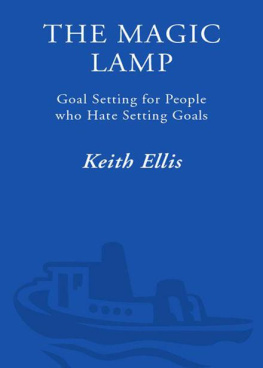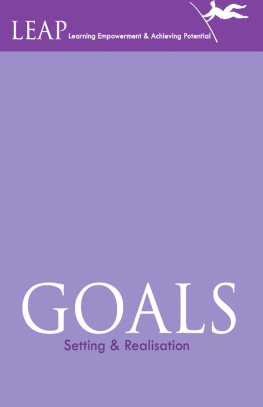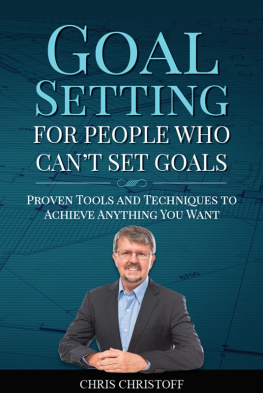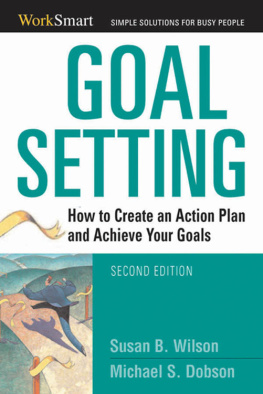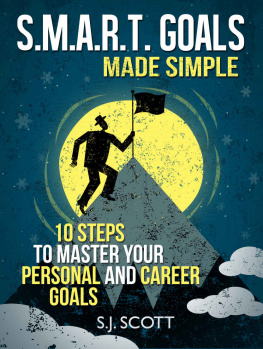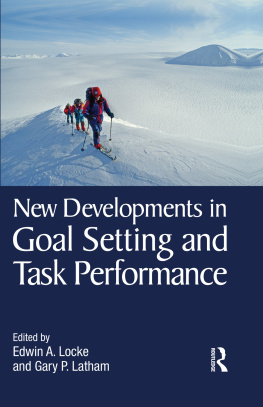Keith Ellis - The Magic Lamp: Goal Setting for People Who Hate Setting Goals
Here you can read online Keith Ellis - The Magic Lamp: Goal Setting for People Who Hate Setting Goals full text of the book (entire story) in english for free. Download pdf and epub, get meaning, cover and reviews about this ebook. year: 2009, publisher: Crown Archetype, genre: Romance novel. Description of the work, (preface) as well as reviews are available. Best literature library LitArk.com created for fans of good reading and offers a wide selection of genres:
Romance novel
Science fiction
Adventure
Detective
Science
History
Home and family
Prose
Art
Politics
Computer
Non-fiction
Religion
Business
Children
Humor
Choose a favorite category and find really read worthwhile books. Enjoy immersion in the world of imagination, feel the emotions of the characters or learn something new for yourself, make an fascinating discovery.
- Book:The Magic Lamp: Goal Setting for People Who Hate Setting Goals
- Author:
- Publisher:Crown Archetype
- Genre:
- Year:2009
- Rating:5 / 5
- Favourites:Add to favourites
- Your mark:
- 100
- 1
- 2
- 3
- 4
- 5
The Magic Lamp: Goal Setting for People Who Hate Setting Goals: summary, description and annotation
We offer to read an annotation, description, summary or preface (depends on what the author of the book "The Magic Lamp: Goal Setting for People Who Hate Setting Goals" wrote himself). If you haven't found the necessary information about the book — write in the comments, we will try to find it.
Keith Ellis: author's other books
Who wrote The Magic Lamp: Goal Setting for People Who Hate Setting Goals? Find out the surname, the name of the author of the book and a list of all author's works by series.
The Magic Lamp: Goal Setting for People Who Hate Setting Goals — read online for free the complete book (whole text) full work
Below is the text of the book, divided by pages. System saving the place of the last page read, allows you to conveniently read the book "The Magic Lamp: Goal Setting for People Who Hate Setting Goals" online for free, without having to search again every time where you left off. Put a bookmark, and you can go to the page where you finished reading at any time.
Font size:
Interval:
Bookmark:
Throw away your trendy psycho-pop self-help books. Here, finally, is a practical guide to the process of existential self-affirmation that philosophers tend to lose in a labyrinth of words and systems. Keith Ellis delivers a profound message with wonderful simplicity.
Dr. James W. Thomasson, former Professor of Theology,
Georgetown University
It's a really wonderful book!
David Essel, host of the nationally syndicated talk show
David Essel Alive
I really like this book! It's useful and practical and easy to read.
Ian Punnett, host of the Ian Punnett show, WGN in Chicago
Excellent! One of the most accessible books about goal setting I've ever read.
Darrell Ankarlo, host of the nationally syndicated
Darrell Ankarlo Show
The Magic Lamp is a beautifully written and inspirational goal-setting guide that can be appreciated by all age groups. It would be a particularly valuable addition to a professor's Recommended Reading' list, and should be made available in libraries and campus bookstores throughout the country.
Anita Fisher, Ed.D., Professor Emeritus, California State
University, Los Angeles
In The Magic Lamp, Keith Ellis presents an intriguing, new, easy-to-follow blueprint for setting and achieving goals by lighting a fire under your wishes and translating them into reality.
Stephanie Winston, author of Stephanie Winston's Best
Organizing Tips
The Magic Lamp messages are profound, and it will benefit anyone who reads it. If you apply its principles exactly as suggested, you too will achieve success in all of your endeavors.
A. Heath Jarrett, Editor, Jarrett's Journal
It's been said that mankind is of three mind sets: those that create, those that understand, and those that neither create nor understand. I think that ignorance exists in the third category, hope in the second, and brilliance in the first. The amount of useful and commonsense advice about goal setting that is contained in The Magic Lamp entitles it to automatic entry into the category of brilliance.
Roger Morrison, Account Manager, Printrak International
Keith Ellis has made a real breakthrough! He has written the first goal-setting book for the rest of usnot just for success junkies and professional self-improvement types, but for real people facing real problems in a very busy world.
John W. Leeger, Technical Architect, SAIC


The recommendations presented in this book represent the opinions of the Author and do not necessarily represent the opinions of the Publisher. The Reader follows these recommendations at his or her own risk. Neither the Author nor the Publisher makes any warranty of any kind, expressed or implied, about the usefulness, practicality, or safety of any of these recommendations. Neither the Author nor the Publisher assumes any liability whatsoever for the Reader's actions, or consequences of the Reader's actions, whether or not those actions may be said to have been influenced by this book. If you are not willing to comply with these limitations, please do NOT read this book.
To Barbara Gray Ellis,
my mother,
who taught me how
to believe in myself

8 Comfort Zone
24 Follow Through

Unlike someone making a speech at the Oscars, I don't have to pretend that I haven't thought at great length about what I want to say. I have. I owe more than I can express to more good people than I can count. But a few of those people have had such a marked influence on me, and on this book, that I want to thank them by name.
Thanks to Margaret Ellis, my wife, who gave me understanding and support when I disappeared for hours every day to work on The Magic Lamp. Then she helped to edit the finished product.
Thanks to Barbara Gray Ellis, my mother, who besides being a great mother and a wonderful human being, is also a fine writer who helped to edit this book.
Thanks to Alan Ellis, my brother, who is the finest wordsmith I know, and one of the most inspirational thinkers. Time after time he came up with great ideas for what I should say in this book, and how I should say it, then let me claim the credit for his thoughts as if they were my own.
Finally, thanks to all the writers and thinkers, the speakers and doers I have studied for all these years. Many of them are listed in the Resources section at the back of this book. Many more are not. To all of them I offer my humble gratitude. When you stand on the shoulders of giants, it's easy to see the sky.

In much of what is written in the English language, the masculine pronouns he, him, and his refer to persons of both sexes. Many women take exception to this. Many men would too, if it worked the other way around. There are two ways to fix this problem: We can change the language, or we can change ourselves. I prefer the latter. Only then will the language follow.
Let us rid personal pronouns of their political significance and thereby deny them the power to divide us. Let male writers use masculine pronouns, and we shall understand nothing more than that these writers are men. Let female writers use feminine pronouns, and we shall understand nothing more than that these writers are women. Let readers see past the pronoun to the writer. When the gender of a pronoun signifies nothing more than the gender of the writerinstead of the gender of reality we will all be on the right path.

In 1921, Dr. Lewis Terman of Stanford University began a landmark study of 1,528 gifted children, all of whom had an IQ above the level of genius. The objective was to better understand the relationship between human intelligence and human achievement. This study became world famous and continued for decades, producing some of the most remarkable insights into the role that intelligence plays in a successful life.
But the most remarkable insight of all was that IQ is not the most important ingredient for success. Instead, Terman's study found that three factors are far more important than sheer intelligence when it comes to achievement: self-confidence, perseverance, and a tendency to set goals. The most important of alleven for geniusesis the tendency to set goals.
I was not part of the Terman studyI'm no geniusbut for some reason I've always been interested in the process of setting goals. I find it particularly fascinating that so many people talk about the power of setting goals, but so few people ever seem to set them.
I was a perfect example. For years I read every book on goal setting that I could lay my hands on. I listened to every audiocassette about goal setting I could beg, borrow, or buy. I attended every seminar about goal setting that came to town, and traveled to many that never made it to town. I knew everything there was to know about setting goals. I just never set any.
Font size:
Interval:
Bookmark:
Similar books «The Magic Lamp: Goal Setting for People Who Hate Setting Goals»
Look at similar books to The Magic Lamp: Goal Setting for People Who Hate Setting Goals. We have selected literature similar in name and meaning in the hope of providing readers with more options to find new, interesting, not yet read works.
Discussion, reviews of the book The Magic Lamp: Goal Setting for People Who Hate Setting Goals and just readers' own opinions. Leave your comments, write what you think about the work, its meaning or the main characters. Specify what exactly you liked and what you didn't like, and why you think so.

